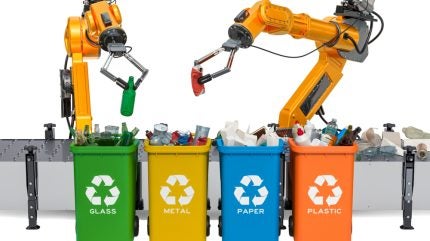
Waste, in its many forms, continues to pile up globally—choking ecosystems, straining landfills, and contributing significantly to greenhouse gas emissions. Against this backdrop, artificial intelligence (AI) has emerged not just as a technological marvel, but as a powerful ally in the fight against waste.
With its capacity to analyse vast amounts of data, learn patterns, and automate processes, AI is reshaping how we understand, manage, and ultimately reduce waste across industries.

Discover B2B Marketing That Performs
Combine business intelligence and editorial excellence to reach engaged professionals across 36 leading media platforms.
From the smart bins of city centres to the algorithms that optimise supply chains, AI is working quietly and efficiently behind the scenes.
As governments, businesses, and individuals become more eco-conscious, the integration of AI into waste management and reduction strategies is not just promising—it is indispensable.
Smarter sorting and recycling
One of the most impactful contributions of AI lies in improving recycling accuracy and efficiency. Traditional recycling processes rely heavily on manual sorting, which is time-consuming, error-prone, and often hazardous for workers.
AI-driven robotic systems are now being employed to streamline this task. Equipped with computer vision and machine learning, these robots can identify, pick, and separate recyclable materials from waste at unprecedented speeds.

US Tariffs are shifting - will you react or anticipate?
Don’t let policy changes catch you off guard. Stay proactive with real-time data and expert analysis.
By GlobalDataFor example, companies such as AMP Robotics and ZenRobotics have developed intelligent robots capable of distinguishing between different types of plastics, metals, and paper products.
These systems are trained on thousands of images to detect subtle differences in material composition, colour, and shape—far surpassing human capabilities in both speed and accuracy.
The result is higher quality recyclables, less contamination, and greater economic viability for recycling centres.
Beyond robotics, AI-powered optical sorters are being deployed to refine recycling processes further. These systems scan waste streams in real time and make instantaneous decisions about where each item should go.
This not only reduces the volume of waste sent to landfill but also ensures that valuable materials are recovered and reintroduced into the production cycle.
Optimising supply chains to curb waste
Waste often begins long before a product reaches the consumer. In fact, inefficiencies in production, inventory management, and logistics contribute significantly to the global waste problem.
Here too, AI offers transformative potential by forecasting demand, managing stock levels, and reducing overproduction.
Retailers and manufacturers are now using AI algorithms to analyse consumer behaviour, seasonal trends, and external factors such as weather or economic shifts.
These insights allow for more accurate demand forecasting, ensuring that products are manufactured in appropriate quantities and delivered just in time—minimising spoilage, unsold stock, and unnecessary transportation.
In the food industry, where waste is particularly prevalent, AI is being harnessed to track freshness, optimise supply chains, and even monitor food quality. Supermarkets are implementing AI systems that predict shelf life and suggest markdowns before products expire, helping reduce the staggering amounts of edible food discarded daily.
Moreover, AI-enabled logistics platforms can determine the most efficient delivery routes, reduce fuel consumption, and cut emissions.
By aligning supply more closely with demand and eliminating logistical redundancies, businesses can not only save costs but also lessen their environmental footprint.
Empowering consumers and policymakers
While much of AI’s role in waste reduction is behind the scenes, its potential to influence individual behaviour and inform policy is equally important. Smart waste monitoring systems are being introduced in homes, offices, and municipalities, providing real-time feedback on waste generation and recycling habits.
Such systems can prompt users when bins are full, track the types of waste being disposed of, and even offer suggestions for better disposal practices.
Cities around the world are deploying AI to manage urban waste more effectively. For instance, by analysing data from smart bins, sensors, and GPS-enabled waste collection trucks, municipal systems can optimise collection schedules, prevent overflowing bins, and reduce fuel usage.
These data-driven strategies not only improve sanitation but also contribute to broader sustainability goals.
AI is also becoming an invaluable tool for environmental regulators and policymakers.
Through satellite imagery analysis, natural language processing, and predictive modelling, AI can monitor illegal dumping, track landfill expansion, and assess the effectiveness of waste policies.
With such capabilities, authorities are better equipped to design interventions, enforce regulations, and measure outcomes with greater precision.
Public engagement is another area where AI is making strides. Apps powered by AI can guide users on how to sort waste correctly, find nearby recycling centres, or locate zero-waste shops.
Some platforms even gamify the process, encouraging individuals to adopt more sustainable habits through incentives and community challenges.
The road ahead
While the potential of AI in waste reduction is immense, its implementation must be guided by ethical considerations, transparency, and equitable access. Concerns about data privacy, job displacement, and digital divides must be addressed to ensure that AI solutions benefit all sectors of society.
Furthermore, collaboration will be key. Governments, tech companies, environmental organisations, and local communities must work together to develop AI systems that are not only technically robust but also socially and environmentally responsible.
In the coming years, as AI continues to evolve, its role in shaping a circular economy will grow stronger.
By turning waste into a resource, optimising systems, and enabling smarter choices, AI can help us move closer to a world where waste is no longer seen as inevitable, but as a problem we have the tools—and the intelligence—to solve.



